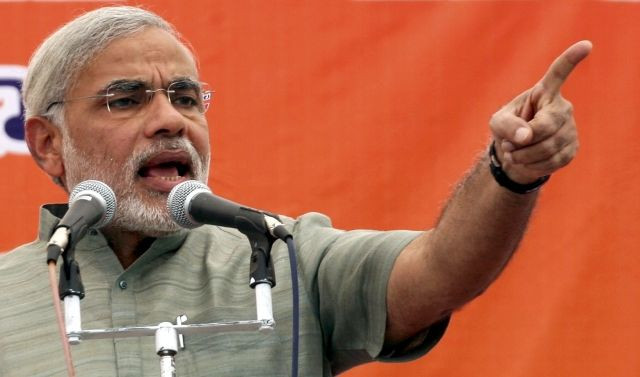Narendra Modi: Controversial Chief Minister In India Re-Elected; Will He Be PM Candidate In 2014?

Bolstering his prime ministerial ambitions in the parliamentary elections to be held in India in 2014, Gujarat Chief Minister Narendra Modi won a record third successive term in the state elections Thursday with a sweeping win for his Bharatiya Janata Party (BJP).
Modi won by a landslide from Maninagar constituency in Gujarat, beating his nearest Congress party rival Shweta Bhatt by a margin of 86,373 votes.
The BJP bagged 103 seats and was leading in 13 of state’s 182 constituencies while the Congress won 53 and was leading in seven assembly seats, according to the Election Commission website at 10:45 GMT.
The election results from this western Indian state of 60 million people — recognized as the highest-scoring among all states of India on matters of social capital in Legatum Institute’s Global Prosperity Index 2012 — have been touted as the defining moment for BJP’s potential prime ministerial candidates for the next Lok Sabha election.
Meanwhile, in the northeastern state of Himachal Pradesh, the Congress won an absolute majority of 36 seats while the BJP bagged 24 and was leading in two constituencies.
However, as the results started coming in, BJP leaders dodged questions on whether Modi would be fielded as the party candidate in the 2014 elections.
"I am not here to define Mr Modi's role in the BJP,” senior BJP leader Balbir Punj said, according to an NDTV report. “Mr Narendra Modi was always a very important factor and he will have even more say now, even if the Congress continues to demonize him."
"Modi has always been an important leader in the BJP... We are not a dynastic party which is led by a Yuvaraj (meaning Prince, referring to Congress Party chief Sonia Gandhi’s son Rahul Gandhi). We function in a pure democratic fashion," BJP chief Spokesperson Ravi Shankar Prasad said when asked if the third straight victory in Gujarat catapulted him to be the party’s prime ministerial choice.
Prasad attributed the victory to Modi’s performance-oriented governance, adding that he fought against vicious rival campaigns in the state as well as internationally.
"What is significant about this election is that in this country where there is so much of caste divide, a leader who has identified with the aspirations of an entire population, has emerged victorious," he said.
He warded off questions about implications of Gujarat victory with regard to BJP's relations with Bihar Chief Minister Nitish Kumar, an important ally for the BJP, who has remained critical of the idea of projecting Modi as a national candidate.
"This issue has been discussed several times. [Relations between BJP and Nitish Kumar’s Janata Dal United or JDU] is very strong and we have fought several polls together," Prasad said.
The communal riots of 2002 in which more than 1,200 people were killed in Gujarat, most of them Muslims, during Modi's first term as chief minister, has been the primary reason for his critics to slam him as a closet Hindu zealot.
Nitish Kumar has not yet commented on Modi's victory.
However, Ali Anwar, a parliamentarian from JDU in Delhi retorted: "What is proved by his win...what does that have to do with us?"
"When they discuss the candidates with us, we will share our feedback. We are a secular country...a leader must exhibit secular credentials," he said, according to an NDTV report.
Modi was denied the U.S. visa in 2005 for the allegedly dubious role he played in the 2002 communal riots. Earlier this month, a group of 25 U.S. lawmakers urged Secretary of State Hillary Clinton to continue Washington’s policy to deny visa to Modi, stating that his government had not adequately pursued justice for the riot victims.
Modi has described the denial of a diplomatic visa and revoking of a business visa as insulting and asked the Congress-led central government to take up the issue with U.S. officials.
© Copyright IBTimes 2025. All rights reserved.





















